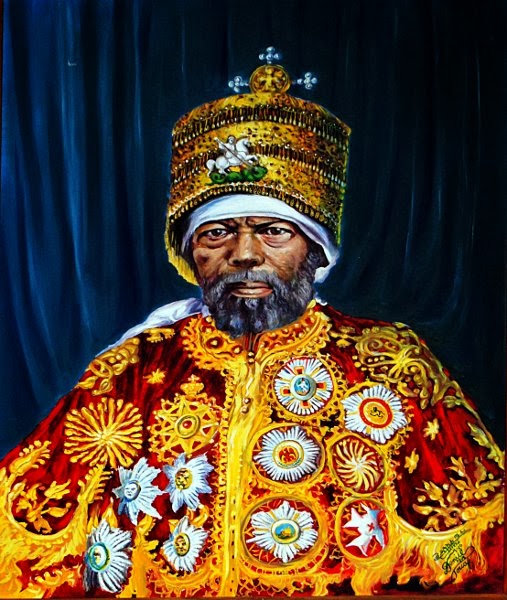The story of Menelik II is truly remarkable! This emperor not only led Ethiopia to victory against colonial powers but also modernized his nation during his reign. His legacy remains a symbol of resilience and independence for many Africans today.
Who Was Menelik II?
Menelik II (also known as Menilek; 1844-1913) became the emperor of Ethiopia in 1889. He is best remembered for his triumph at the Battle of Adwa in 1896, where his forces defeated the Italian army. This victory solidified Ethiopia's independence, a rare achievement during the colonial era. Menelik's reign brought significant advancements to Ethiopia, including compulsory education and modern telecommunication systems.
However, his rule was not without controversy. While he fostered national pride and independence, there were instances of harsh treatment towards some of his subjects. Menelik II's legacy is complex but undeniably important in the history of Africa.
Early Life
Born on August 17, 1844, in Ankober, Shewa, Ethiopia, Menelik was originally named Sahle Mariam. He was the son of Haile Malakot, who became the king of Shewa in 1847. Menelik's mother, Woizero Ejigayehu, played a significant role in his upbringing.
Tragically, Menelik's father passed away in 1855, leading to a tumultuous period in his life. He was taken prisoner by Emperor Tewodros II but was able to continue his education during captivity. Eventually, Menelik escaped in 1865, marking the beginning of his journey to reclaim his throne.
King of Shewa
Upon his escape, Menelik returned to Shewa and claimed its throne. His ambitions did not stop there; he aimed to become the emperor of all Ethiopia. However, he had to navigate the political landscape and pledge loyalty to Emperor Yohannes IV, who ruled from 1872 to 1889.
After Yohannes's death in March 1889, Menelik emerged as the strongest contender for the imperial throne and successfully claimed the title of emperor.
Emperor of Ethiopia
On November 3, 1889, Menelik was crowned as the king of kings (negus negast) at the Church of Mary on Mount Entoto. His wife, Taitu Betul, who he married during Easter mass in 1883, was crowned empress just two days later.
Menelik's reign marked a transformative period for Ethiopia. He introduced modern infrastructure, including telegraphs and telephone lines, and established Addis Ababa as the new capital. His efforts led to the introduction of compulsory schooling and the founding of Ethiopia's Bank of Abyssinia.
The Battle of Adwa
Menelik signed the Treaty of Wichale with Italy on May 2, 1889. However, a disagreement over its interpretation led to rising tensions. Menelik refused to accept Italy's claim that Ethiopia would become a protectorate.
In 1895, Italy declared war on Ethiopia, believing it could easily defeat the nation. Menelik rallied his people with a powerful proclamation, urging them to defend their homeland. This call to arms culminated in the historic Battle of Adwa on March 1, 1896, where Ethiopian forces triumphed over the Italian army.
Accomplishments
Menelik II's reign was marked by significant territorial expansion and modernization efforts. The borders established during his time still resemble those of modern Ethiopia. He was instrumental in creating a new capital at Addis Ababa and spearheaded various infrastructure projects.
During his tenure, Ethiopia saw the introduction of the first Amharic newspaper and the establishment of compulsory schooling for children. Menelik also enhanced international relations, signing treaties with multiple countries, including the United States.
Criticism
Despite his accomplishments, Menelik's rule faced criticism. He profited from the slave trade in his earlier years, and there were instances of violence against those who opposed him. As his empire expanded, he imposed Christian leadership in non-Christian areas, which led to cultural tensions.
After his victory at Adwa, Menelik chose not to expel Italians from Eritrea, a decision that remains debated among historians.
Death
Menelik II passed away on December 12, 1913, in Addis Ababa at the age of 69. His declining health began around 1907, and he became unable to rule effectively after suffering a stroke in 1909.
Although Menelik had daughters, he had no sons to succeed him. His legacy continued through his descendants, with one of his daughters eventually deposing his grandson in 1916.
Key Takeaways
What You Will Learn
- Menelik II was a pivotal figure in preserving Ethiopia's independence from colonial rule.
- His leadership during the Battle of Adwa marked a significant victory for African nations against colonial powers.
- Menelik's reign saw modernization efforts that laid the groundwork for Ethiopia's future development.
- His legacy is complex, encompassing both achievements and controversies regarding treatment of subjects and cultural policies.
Menelik II's life and reign offer valuable lessons on leadership, resilience, and the fight for independence. His story continues to inspire many, reminding us of the importance of standing firm against oppression.
Marla Maples: A Journey Through Fame, Love, And Self-Discovery
Willow Smith: A Journey From Fame To Self-Discovery
Lizzo: From Humble Beginnings To Global Stardom


